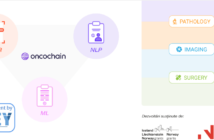- Polish text understanding startup Smabbler claims to bring an absolutely unique solution to the table
- Unlike the existing solution, Smabbler is self-learning and will work for all topics and languages
- Next Road Ventures is fully on board and is eager to invest in Smabbler in the next round
Polish data automation solution provider Smabbler was among the winners of Vestbee’s European Startup Challenge. The startup offers a solution to transform any text – regardless of its topic or language – into actionable knowledge. Smabbler will now prepare for its next investment round.
Luke Pytel (who was a guest at an ITKeyMedia podcast recently) and Aga Kopytko started Smabbler in 2018. Prior to that, they were working on a different, less ambitious IT project together. Back in 2013, they were tasked with a solution that would match companies – potential partners – based on company websites. In the course of their work, they stumbled into a bigger problem: they needed an AI for understanding written language, and the existing solutions were largely flawed and unfitting. They always worked with only one topic in only one language, and each new use case demanded a new solution built from the ground up.
Present-Day State of Text Recognition

Luke Pytel (right) and Aga Kopytko (left), co-founders of Smabbler
‘If you want to have an algorithm that would analyze text and understand what is in the text, first you need to hire a team of data engineers. Then you need to manually prepare a dataset that would be used to train the algorithm. That means manual work on tens of thousands of emails/ messages or other text data. Then you need to find the best possible algorithm for your use case, so you have to do a number of experiments. Then you choose the best algorithm and train it with all the data,’ Smabbler’s co-founder and CEO Łukasz Pytel explains the steps.
According to Mr Pytel, building this kind of conventional language AI will require 6-12 months and at least EUR 100k EUR. If the work is successful, the resulting algorithm will be able to:
- understand text in a very narrow topic (e.g. customer service for a bank);
- work in one language;
- understand simple questions and messages.
Even though language AIs have improved significantly since 2014, these main disadvantages are still there. The development process is complicated and costly, and the outcome can rarely be replicated for other use cases.
The Need for a Radically New Solution
That’s why Smabbler team realized that they need to build their technology from the ground up, without referring to any existing solutions. In other words, Smabbler develops brand new algorithms in-house, exploring new paths and tackling new challenges along the way.
‘Enterprises are evolving and converging around data. They build new departments to handle data and automation responsibilities. Most enterprise data is text, yet there are no holistic solutions to unlock the value hidden in textual assets,’ Marcin Laczynski, partner at Next Road Ventures, tells ITKeyMedia.
In May 2021, Next Road Ventures led Smabbler’s investment round. Mr Laczynski sees Smabbler as a horizontal language engine – an intelligent data layer – built to interpret, generalize and infer from unstructured text, making it instantly usable.
A Few Scarce Details
Smabbler claims that their solution’s biggest decisive advantage is that it is topic- and language-agnostic. ‘Imagine an expert in any topic whom you want to talk in any language. This expert will read a book or any other data repository and transform this information into sophisticated and precise hashtags. Then, you can analyze it on a massive scale,’ Mr Pytel illustrates.
To wrap up, Smabbler’s key advantages are:
- better accuracy in understanding text than current solutions;
- self-learning;
- no need for data engineering teams and data preparation;
- universality across languages and domains.
What’s Next?

Marcin Laczynski, Partner at Next Door Ventures
Naturally, Smabbler doesn’t reveal any more details about their unique technology. The company remains equally secretive about the terms for their next round of investment. ‘We are not in a rush to raise money from investors. It is very important for us that our investors understand and deeply believe in what we do. We are happy to get new investors on-board if they can help us develop our business – either with network or experience,’ Mr Pytel says.
However, Mr Laczynski shares that his VC intends to invest in Smabbler again ‘soon’: ‘Having the product validated by first paying customers, Smabbler is ready to scale and soon opens a new financing round. We are absolutely planning to invest in them again.’
The need for data automation grows as digital transformation of all spheres accelerates. Yet text recognition solutions that are available at hand today are, on the one hand, topic- and language-specific, and, on the other hand, time- and resource-consuming. The solution suggested by Smabbler is both universal and efficient. Hopefully, the startup can demonstrate it soon enough.

Kostiantyn is a freelance writer from Crimea but based in Lviv. He loves writing about IT and high tech because those topics are always upbeat and he’s an inherent optimist!





